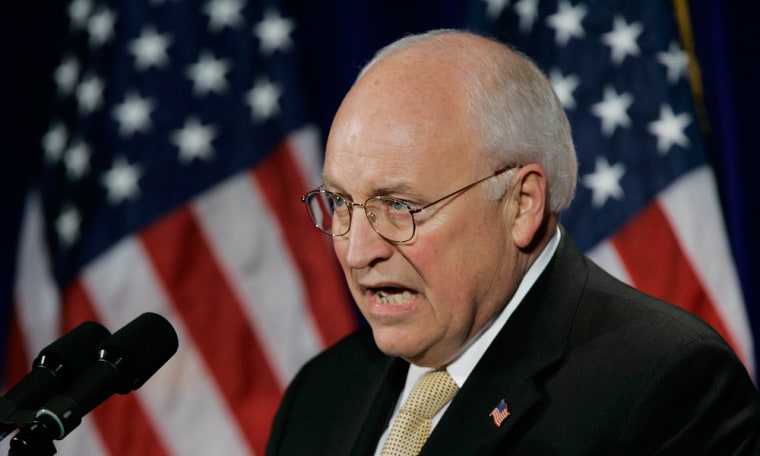It is I. Lewis "Scooter" Libby whom special prosecutor Patrick Fitzgerald is trying to put in jail in connection with the disclosure of a CIA operative’s identity, but as Libby’s trial reached the halfway point Wednesday, Fitzgerald appeared to be just as intent on putting Vice President Dick Cheney near the center of the case.
Libby, Cheney’s former chief of staff, is charged with perjury for telling a federal grand jury in 2004 that he first learned of the operative’s covert status from NBC News Washington bureau chief Tim Russert. Special counsel Patrick Fitzgerald wrapped up his case Wednesday with Russert’s testimony contradicting Libby’s assertion.
(MSNBC.com is a joint venture of NBC Universal News and Microsoft.)
It is a crucial point. No one has been charged with the act underlying the case — the disclosure of Valerie Plame’s covert status as a weapons analyst for the CIA. How that happened is already known: It was former Deputy Secretary of State Richard Armitage who told syndicated columnist Robert Novak, not Libby.
What is really being hashed over in U.S. District Court in Washington is the familiar drama of a garden-variety cover-up. And as the trial goes on, the central figure has been Cheney, who is depicted as having been obsessed with Plame’s husband, Joseph Wilson, and as seeking any way he could find to discredit Wilson’s contention that the Bush administration faked some of the evidence it used to make its case for war in Iraq.
Target: Wilson
In the prosecution’s theory of the case, Libby tripped himself up while doing the bidding of Cheney, who personally directed the drive to debunk Wilson, a former U.S. ambassador in the Middle East who was sent to Africa by the CIA to investigate claims that Iraq had sought to acquire uranium from Niger.
After Wilson wrote in an op-ed column for The New York Times that he had found the claim baseless — in direct contradiction to a statement by President Bush — Cheney mounted an all-out attack on Wilson by implying that he was chosen for the mission on the basis of nepotism, not his qualifications, the evidence introduced so far suggests.
“As the defendant admitted in his grand jury testimony, he communicated extensively with the Vice President regarding the Wilson op-ed during the relevant period, and received direction from the Vice President regarding his response,” Fitzgerald said in a court filing.
In tapes of Libby’s grand jury testimony, jurors have heard Libby say he actually first learned of Plame’s covert status from Cheney himself. Court documents show that Libby then spoke to two reporters about Plame that day. (He then told the grand jury that he forgot the conversation and assumed he had learned of Plame from Russert and other journalists, which is the narrow question that the trial is about.)
Jurors heard Libby say Wilson’s column was a topic of conversation with Cheney on a daily basis. They also heard Libby say Cheney directed him to leak parts of a classified intelligence report bolstering the claim that Iraq had sought uranium from Niger.
Cheney reassured him that Bush had personally authorized the leak to Judith Miller, then a reporter for The New York Times, Libby told the grand jury.
Ex-Cheney aide fills in the picture
Testimony from Cheney’s former communications director, Cathie Martin, also painted a picture of the vice president as having been deeply involved in efforts to repudiate Wilson’s claim from the beginning. Martin testified that even before Wilson wrote his op-ed, Cheney’s office was seeking information from the CIA about his mission to Africa.
Once Wilson’s column appeared, in July 2003, the vice president’s office went into crisis mode, Martin testified, saying Cheney had her deliver transcripts of news reports about the case to him personally.
Martin testified that Cheney personally dictated a list of “talking points” outlining how Ari Fleischer, then the White House press secretary, should rebut Wilson’s report; on another occasion, she said, Cheney wrote out on a note card what Libby should say when he was contacted by a reporter.
And then there was this note, scrawled in Cheney’s own handwriting: “Not going to protect one staffer + sacrifice the guy that was asked to stick his neck in the meat grinder because of the incompetence of others.” Prosecutors contended that this established Cheney’s determination to protect Libby, and thus his office, from being made a scapegoat for the White House and senior adviser Karl Rove.
In essence, according to the prosecution case, Libby was just the curtain. Cheney was the man behind the curtain.
“Everything ends up at Dick Cheney’s desk,” Jonathan Turley, a constitutional law specialist at George Washington University, said in an interview with MSNBC-TV. “His right-hand man is indicted; he’s intimately involved in the Niger allegation with weapons of mass destruction; he’s the one that seems to have instructed Libby.
“The biggest question is not whether he will be called as a witness but why he wasn’t a co-conspirator,” Turley added.
